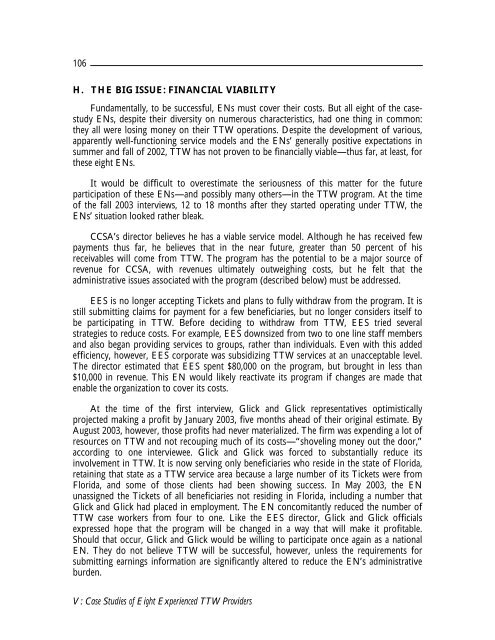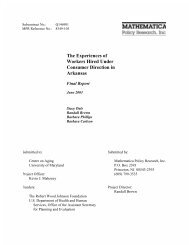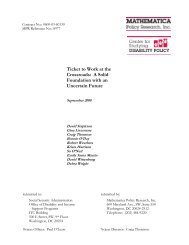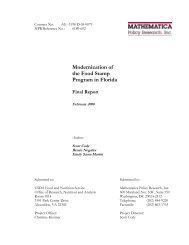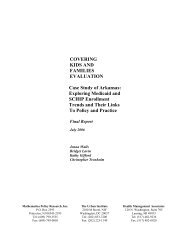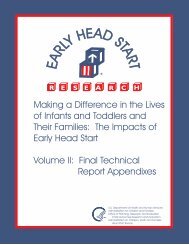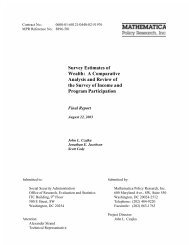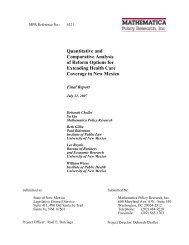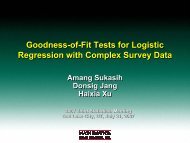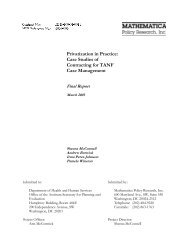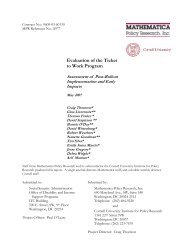Evaluation of the Ticket to Work Program Initial Evaluation Report
Evaluation of the Ticket to Work Program Initial Evaluation Report
Evaluation of the Ticket to Work Program Initial Evaluation Report
You also want an ePaper? Increase the reach of your titles
YUMPU automatically turns print PDFs into web optimized ePapers that Google loves.
106<br />
H. THE BIG ISSUE: FINANCIAL VIABILITY<br />
Fundamentally, <strong>to</strong> be successful, ENs must cover <strong>the</strong>ir costs. But all eight <strong>of</strong> <strong>the</strong> casestudy<br />
ENs, despite <strong>the</strong>ir diversity on numerous characteristics, had one thing in common:<br />
<strong>the</strong>y all were losing money on <strong>the</strong>ir TTW operations. Despite <strong>the</strong> development <strong>of</strong> various,<br />
apparently well-functioning service models and <strong>the</strong> ENs’ generally positive expectations in<br />
summer and fall <strong>of</strong> 2002, TTW has not proven <strong>to</strong> be financially viable—thus far, at least, for<br />
<strong>the</strong>se eight ENs.<br />
It would be difficult <strong>to</strong> overestimate <strong>the</strong> seriousness <strong>of</strong> this matter for <strong>the</strong> future<br />
participation <strong>of</strong> <strong>the</strong>se ENs—and possibly many o<strong>the</strong>rs—in <strong>the</strong> TTW program. At <strong>the</strong> time<br />
<strong>of</strong> <strong>the</strong> fall 2003 interviews, 12 <strong>to</strong> 18 months after <strong>the</strong>y started operating under TTW, <strong>the</strong><br />
ENs’ situation looked ra<strong>the</strong>r bleak.<br />
CCSA’s direc<strong>to</strong>r believes he has a viable service model. Although he has received few<br />
payments thus far, he believes that in <strong>the</strong> near future, greater than 50 percent <strong>of</strong> his<br />
receivables will come from TTW. The program has <strong>the</strong> potential <strong>to</strong> be a major source <strong>of</strong><br />
revenue for CCSA, with revenues ultimately outweighing costs, but he felt that <strong>the</strong><br />
administrative issues associated with <strong>the</strong> program (described below) must be addressed.<br />
EES is no longer accepting <strong>Ticket</strong>s and plans <strong>to</strong> fully withdraw from <strong>the</strong> program. It is<br />
still submitting claims for payment for a few beneficiaries, but no longer considers itself <strong>to</strong><br />
be participating in TTW. Before deciding <strong>to</strong> withdraw from TTW, EES tried several<br />
strategies <strong>to</strong> reduce costs. For example, EES downsized from two <strong>to</strong> one line staff members<br />
and also began providing services <strong>to</strong> groups, ra<strong>the</strong>r than individuals. Even with this added<br />
efficiency, however, EES corporate was subsidizing TTW services at an unacceptable level.<br />
The direc<strong>to</strong>r estimated that EES spent $80,000 on <strong>the</strong> program, but brought in less than<br />
$10,000 in revenue. This EN would likely reactivate its program if changes are made that<br />
enable <strong>the</strong> organization <strong>to</strong> cover its costs.<br />
At <strong>the</strong> time <strong>of</strong> <strong>the</strong> first interview, Glick and Glick representatives optimistically<br />
projected making a pr<strong>of</strong>it by January 2003, five months ahead <strong>of</strong> <strong>the</strong>ir original estimate. By<br />
August 2003, however, those pr<strong>of</strong>its had never materialized. The firm was expending a lot <strong>of</strong><br />
resources on TTW and not recouping much <strong>of</strong> its costs—“shoveling money out <strong>the</strong> door,”<br />
according <strong>to</strong> one interviewee. Glick and Glick was forced <strong>to</strong> substantially reduce its<br />
involvement in TTW. It is now serving only beneficiaries who reside in <strong>the</strong> state <strong>of</strong> Florida,<br />
retaining that state as a TTW service area because a large number <strong>of</strong> its <strong>Ticket</strong>s were from<br />
Florida, and some <strong>of</strong> those clients had been showing success. In May 2003, <strong>the</strong> EN<br />
unassigned <strong>the</strong> <strong>Ticket</strong>s <strong>of</strong> all beneficiaries not residing in Florida, including a number that<br />
Glick and Glick had placed in employment. The EN concomitantly reduced <strong>the</strong> number <strong>of</strong><br />
TTW case workers from four <strong>to</strong> one. Like <strong>the</strong> EES direc<strong>to</strong>r, Glick and Glick <strong>of</strong>ficials<br />
expressed hope that <strong>the</strong> program will be changed in a way that will make it pr<strong>of</strong>itable.<br />
Should that occur, Glick and Glick would be willing <strong>to</strong> participate once again as a national<br />
EN. They do not believe TTW will be successful, however, unless <strong>the</strong> requirements for<br />
submitting earnings information are significantly altered <strong>to</strong> reduce <strong>the</strong> EN’s administrative<br />
burden.<br />
V: Case Studies <strong>of</strong> Eight Experienced TTW Providers


